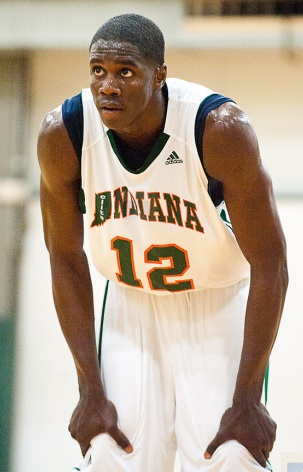One word sums up NCAA’s ruling: absurd
 There have some terrible acts committed under the watch of the NCAA over the years, acts that make you question the integrity of college athletics. Reggie Bush’s name comes to mind. So does Jim Tressel’s and recent allegations of academic fraud at North Carolina.
There have some terrible acts committed under the watch of the NCAA over the years, acts that make you question the integrity of college athletics. Reggie Bush’s name comes to mind. So does Jim Tressel’s and recent allegations of academic fraud at North Carolina.
The NCAA has seen these acts, and it has likely been disgusted by them like we all have. It wanted to make sure such violations didn’t occur again. I get that.
But the system it has in place right now is, as ESPN’s Jay Bilas put it, absurd.
The NCAA’s ruling on Tuesday that Indiana freshmen Hanner Mosquera-Perea and Peter Jurkin will be suspended for the first nine games of this season and forced to pay money to charity is the perfect example why the system is faulty [insert your own word here].
Mosquera-Perea and Jurkin did nothing wrong. They came to the United States from foreign countries with the A-HOPE Foundation in search of a future. Sure, they received some benefits from A-Hope and its founder, Mark Adams, but they had little to nothing of their own when they came here.
Plus, the NCAA had no issue with the benefits Mosquera-Perea and Jurkin received. Their problem had to do with the fact that Adams, who also served as Mosquera-Perea’s guardian, was considered an Indiana booster when he provided these benefits. A booster, despite the fact he donated only $185 over a seven-year span from 1986-1992. That money came in the form of checks written by Adams’ ex-wife for bumper stickers, in the amount of $20-$30 per year, according to Adams.
That $185 over seven years — such an incredibly small amount — is costing two innocent players a total of 18 games and nearly $1,500.
“What you’ve got is a system where people are thinking about slippery slopes and pandora’s box and all the worst things that can happen when they need to look at the individual situation and say, ‘look, this is ridiculous,'” Bilas told Inside the Hall. “Instead of thinking about messages, think about the players. These are unpaid players in a professional system. So they’re asked to pay money back? For what? Because somebody bought a car sticker? That’s absurd.
“It’s even more laughable when you consider the NCAA is going through a process right now where all they’re talking about is addressing real threats to integrity. I hardly think any reasonable person looks at Perea and Jurkin and thinks that they’re real threats to integrity.”
Like Bilas alludes to, it’s not possible Mosquera-Perea and Jurkin could have known Adams was considered an Indiana booster. The money was “donated” before either player was even born. And to take it a step further, Adams said he tried to find out what was permitted and what was not, and the NCAA failed to provide him with an answer.
“A year and a half ago, I met with IU’s compliance and IU’s legal representation, and I had a conference call that was taped with the NCAA,” Adams told Inside the Hall. “I said, ‘nobody’s trying to do anything wrong here. I’ve been on the website, what can a non-profit organization provide these international students and what can’t they provide them? We just want to make sure we’re not doing anything wrong.’ Their response was, ‘we don’t have a handle on that right now and we can’t tell you the answer to that question.’
“They’ve never since then given me an answer. I said, ‘I’d be glad to drive up there anytime and show you what we’re doing. You tell me what we can and can’t do.’ And I provided over four years of bank records just to show them that no one was doing anything wrong.”
Adams tried to find out what the specific rules were. There apparently weren’t any. He wasn’t trying to pull anything or do something behind someone’s back. He was simply trying to help two kids live a better life in the U.S. Adams made a real effort to provide the NCAA with everything that he had. He thought he had done enough.
When I talked to Adams on the phone Tuesday night, he sounded distraught. He struggled to find the right words to describe his reaction.
“I was stunned really that they would do that. I would have never thought it would happen. It’s just an unreasonable penalty for two kids who have done nothing wrong. I would have never dreamt of this.”
Indiana has appealed the NCAA’s decision, but it seems unlikely the organization will change its ruling. Even though Indiana has already been harmed, though, it’s impossible to ignore the glaring problem that is the NCAA going forward. It treated this situation like the other serious ones it has seen in the past. But when you examine it by itself, it’s absolutely nothing like any of those other situations.
The NCAA has to develop the ability to look at each case individually and make a fair and logical reasoning on that case. If it doesn’t, it will end up with more head-scratching rulings like the one it released Tuesday evening.
“At some point, the revenue drivers have got to look seriously at whether they want to start over with something else [without the NCAA],” Bilas said. “When you get results like this, the public trust in the organization is damaged. It’s hard to look at these rulings and keep a straight face when you’re listening to people within the organization talk.”
Filed to: Hanner Mosquera-Perea, Jay Bilas, Mark Adams, Peter Jurkin
